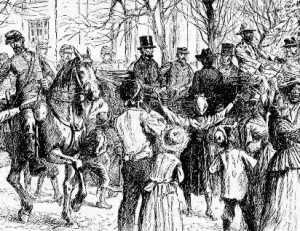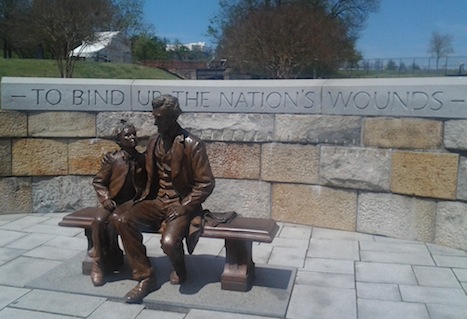"He Came Instead as a Peacemaker..."
“Let ‘Em Up Easy”—Lincoln in Richmond
The historical record doesn’t say who was more excited on April 4, 1865—150 years ago today: Tad Lincoln, celebrating his twelfth birthday that day, or his father, Abraham, who was finally entering Richmond after five springs of war. “Thank God that I have lived to see this!” Lincoln said.The Federal breakthrough at Petersburg on the morning of April 2 had forced the Confederate withdrawal from Petersburg and Richmond. To the president, the welcome news seemed almost surreal. “It seems to me that I have been dreaming a horrid dream for four years,” Lincoln said, “and now the nightmare is gone. I want to go to Richmond.”
Up the James River he went, accompanied by his young son and chaperoned by Admiral David Porter. Thousands of freed slaves thronged the pair, driving home the true fruits of the Federal victory. Finally, a detachment of soldiers muscled their way in and escorted the Lincolns on their walking tour.
“I should have preferred to see the President of the United States entering the subjugated stronghold of the rebels with an escort more befitting his high station,” Porter later said, “yet that would have looked as if he came as a conqueror to exult over a brave but fallen enemy. He came instead as a peacemaker, his hand extended to all who desired to take it.”
Indeed, while visiting the home of his Confederate counterpart, Jefferson Davis, someone asked Lincoln what he intended to do to Southerners now that the Confederacy had fallen. Lincoln replied that he didn’t intend to issue specific orders on that score, but he nonetheless made his wishes clear to the army: “If I were in your place, I’d let ’em up easy.”
Lincoln’s magnanimous tone proved vital in the days ahead. As Grant hunted Lee’s army to ground and forced their surrender, triggering a domino of subsequent surrenders across the South, Lincoln’s magnanimity guided surrender negotiations. This proved particularly important in the wake of Lincoln’s assassination, just days after the Appomattox surrender. “With malice toward none,” the president had said in his second inaugural address, “with charity for all.”
This vision guided Grant as he oversaw the surrenders. “I knew his goodness of heart,” Grant said of Lincoln in his memoirs, “his generosity, his yielding disposition, his desire to have everybody happy, and above all his desire to see all the people of the United States enter again upon the full privileges of citizenship with equality among all.”
Tad Lincoln spent this birthday touring the Confederate capital with his father, visiting the Confederate White House, the Virginia state capital, and Libby Prison. They eventually returned to the river and, by boat, to City Point. Such sights would make an impression on any curious twelve year old. I wonder, though, what impression their encounter with the freed slaves made on him.
“They all wanted to shake hands with Mr. Lincoln or his coat tail or even to kneel down and kiss his boots!” Porter had said of the encounter. Tad, knowing all his father had gone through over the previous four-plus years but perhaps not truly understanding it, must have had his eyes opened at least a little.




<< Home